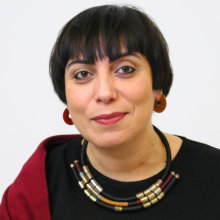
Ilaria SICARI
- Position
- Research Grant Holder
-
ilaria.sicari@unive.it
- Website
-
www.unive.it/people/ilaria.sicari (personal record)
Ilaria Sicari is a MSCA postdoctoral research grant holder (Horizon Europe 2022, Marie Skłodowska-Curie Action, PF, Global Fellowship) with the project "Transnational Book Diplomacy beyond the Cultural Cold War: Towards a Socio-Cultural History of the Tamizdat", thanks to which she will be a visiting scholar at the Center for Russian, East European and Eurasian Studies of Stanford (2023-25) and at Leiden University College (2025). This interdisciplinary research project (TAMIZDAT) – which combines Slavic studies with historical and cultural studies to analyze the production and circulation of clandestine Soviet and Eastern European literature in the context of the so-called cultural Cold War – will be carried out under the supervision of Duccio Basosi (Ca' Foscari), Norman Naimark (Stanford) and Giles Scott-Smith (UC Leiden).
She earned a Bachelor’s degree in Foreign Language and Literature (University of Bologna, 2008), a Master’s degree in Russian Studies (Ca’ Foscari University of Venice, 2012) and a Ph.D. in Modern Languages, Cultures and Societies in the Slavonic field (Ca’ Foscari, 2017).
From 2021 to 2023, she was a postdoc research grant holder at Ca' Foscari University of Venice with a project entitled “The Transnational Socialization of Texts and the Formation of the European Cultural Identity in the Context of the Cold War: the Case of Italian Tamizdat (1957-1991)”. She was adjunct professor of Russian Literature at the University of Bologna (2022-23) and at the University of Florence (2018-20), where she taught seminars on Dostoevsky and Russian populism as well as classes – at both BA and MA levels – on eighteenth-century (Pushkin, Gogol', Lermontov), nineteenth-century (Goncharov, Dostoevsky, Tolstoy, Chekhov) and twentieth-century literature (Akhmatova, Zamyatin, Pil'nyak, Solzhenitsyn, Sinyavsky, Daniel', Amal'rik, Ginzburg, Tarsis).
During her doctoral studies, thanks to the Overseas scholarship, she conducted her research at the Higher School of Economics in Moscow (2015-16), collaborating with the research group “InterLit” (Internacional’naia literatura, International Literature) under the supervision of E. Zemskova and E. Ostrovskaya. From 2017 to 2018 she was member of the research group “The Reception of Soviet Political Repressions in the French-Italian Cultural Universe (1917-1987)” directed by C. Pieralli (University of Florence) and L. Jurgenson (Paris-Sorbonne University). Since 2018 she collaborates with two digital research projects about dissent and the reception of unofficial Soviet literature in the West: “On the Two Sides of the Iron Curtain: Culture of Dissent and the Definition of a European Identity in the Late Twentieth Century between Italy, France and the USSR (1956-1991)”, based at the University of Florence and coordinated by C. Pieralli and T. Spignoli; and “Banned Books from Russia and Eastern Europe: An Online Archive of Documents (1956-1991)”, directed by Yasha Klots (CUNY University). Since 2022 she collaborates with the digital platform "Voci libere in USSR/Free Voices in the USSR", a scientific project coordinated by C. Pieralli and M. Sabbatini (University of Pisa) and published by Firenze University Press, for which – in addition to studying several tamizdat editions and publishing houses – she edited the section devoted to the Soviet human rights movement and to the abuse of psychiatry for political purposes under Khrushchëv and Brezhnev.
Since 2012 she has been working as a translator and consecutive interpreter from Russian and English into Italian, collaborating with a number of cultural institutions (University of Venice, 2012; Teatro La Fenice, 2013; Istituto dell'Enciclopedia Italiana Treccani, 2019).
Her research on the reception of foreign literature in the Soviet Union and of unofficial Soviet literature in the West focuses on the agency of socio-cultural actors (translators, publishers, literary agents, editors, dissidents, etc.) who contributed to the transnational production and circulation of such texts. Her research interests range from Comparative literature to Translation studies, Reception studies, Cultural and Intellectual history of the Soviet Russia. In the Slavonic field, she is interested in Soviet and Eastern European literary institutions, censorship, cultural policies, unofficial literature (samizdat and tamizdat), cultural cold war, dissent and human rights movements. Since 2012 her translations and articles have been published in a number of books and international scientific journals.
She is a member of: the Association of Italian Slavists (AIS); the Association for Slavic, East European and Eurasian Studies (ASEEES); and the American Association of Teachers of Slavic and East European Languages (AATSEEL). Former member of the British Association for Slavonic and East European Studies (BASEES, 2015-16).
Inspired by the idea of prof. Johannes Haushofer of making visible the insuccesses which are never recorded in the curricula (even though they are important – in term of times and emotional impact – in each academic path), I've decided to publish here my own CV of failures:
Deegree programs I did not get into – PhD program in Slavonic Studies, 2013 (University College of London)
Academic positions and fellowships I did not get – Post-doc Research Fellowship Marie Sklodowska-Curie, 2018; Adjunct Professor of Russian Language and Literature, 2019 (University of Modena and Reggio Emilia); Adjunct Professor of Russian Literature, 2020 (University Roma Tre); Postdoctoral Fellowship Program in Russian Studies, 2021 (Davis Center, Harvard); Wayne Vucinich Post-doc Fellowship in Russian Studies, 2022 (CREEES, Stanford); George F. Kennan Fellowship, 2022 (Wilson Center, Washington)
Research funding I did not get – Post-doc Research Grant in Russian Literature, 2018 (University La Sapienza, Rome); Post-doc Research Grant in Russian Language, 2019 (University of Catania); Postdoctoral Research Grant, 2022 (Aleksanteri Institute, Helsinki); Post-doc Research Grant in Comparative Literatures, 2022 (University La Sapienza, Rome)
Papers rejections from academic journals – Slavic Review, 2022
Awards I did not get – Literary Prize "Raduga", 2015 (shortlisted as translator from Russian to Italian)
The information above have been uploaded on Ca' Foscari website direclty by the user this webpage refers to. The correctness and truthfulness of the published information are responsibilities of the relevant user.
